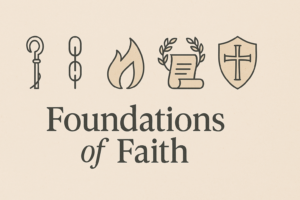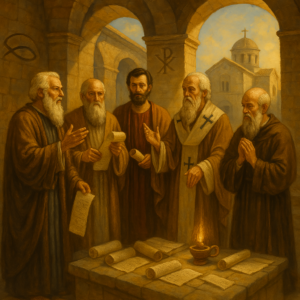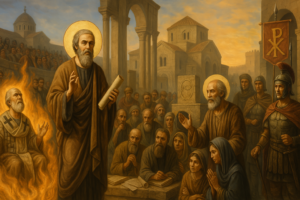Estimated reading time: 15 minutes
Key Takeaways
- The early Church Fathers played a crucial role in shaping the foundation of Christian doctrine and practice.
- They defended orthodox Christianity against heresies and established core theological concepts like the Nicene Creed.
- Their writings provide essential continuity between the apostolic age and later Christian development.
- Prominent figures include Irenaeus of Lyons, St. Justin Martyr, Saint Ignatius of Antioch, Tertullian, Origen, Polycarp of Smyrna, and Augustine.
- Their teachings and commentaries continue to influence Christian theology, biblical interpretation, and church practices today.
The early Church Fathers stand as towering figures in Christian history. These remarkable individuals shaped the very foundation of Christian doctrine during Christianity’s first centuries. Their profound influence extends from biblical interpretation to the establishment of core theological concepts that billions of believers embrace today.
Introduction to the Early Church Fathers
The early Church Fathers provided essential continuity between the apostolic age and later Christian development. Through their diligent preservation and interpretation of apostolic teachings, they ensured Christianity maintained its core identity despite external pressures and internal challenges.
These spiritual giants contributed significantly during a crucial formative period. They crafted coherent theological frameworks, established methods for interpreting scripture, and defended orthodox Christianity against numerous heresies threatening to divide the young faith.
One of their most enduring legacies is the Nicene Creed. This fundamental statement of Christian belief emerged directly from the teachings and writings of the Early Church Fathers. The creed remains a cornerstone of Christian identity across most denominations worldwide, demonstrating these early thinkers’ lasting impact on Christian doctrine.
Historical Background of the Early Church Fathers
The history of the early Church Fathers spans an extraordinary period beginning with the Apostles’ contemporaries in the late first century and extending to Augustine in the fifth century. This tumultuous era saw Christianity transform from a persecuted sect to the dominant religion of the Roman Empire.
The term apostolic fathers refers specifically to those church leaders from the first and second centuries who personally knew the Apostles or their direct disciples. These include figures like Clement of Rome, Ignatius of Antioch, and Polycarp of Smyrna. Their proximity to the original apostles gave their writings special authority in establishing Christian traditions and interpretations.
Christianity faced numerous challenges during this developmental period:
- Intense persecution from Roman authorities
- The need to define core doctrines
- Competing interpretations of Jesus’ teachings
- Various heretical movements
Several pivotal events shaped this era:
- 64-313 AD: Sporadic but intense persecution of Christians
- 313 AD: Emperor Constantine issues the Edict of Milan, legalizing Christianity
- 325 AD: The Council of Nicaea addresses the Arian controversy
- 381 AD: The Council of Constantinople further refines Christian doctrine
- 397 AD: Church councils begin formalizing the biblical canon
The early Church Fathers wrote extensively during these challenging times. Their letters, theological treatises, and apologetic works formed the backbone of developing Christian thought and practice. They established precedents for biblical interpretation, worship practices, and church governance that continue to influence Christianity today.
Learn more about the importance of the Early Church Fathers at Catholic Clutch.
Prominent Early Church Fathers and Their Writings
Irenaeus of Lyons Against Heresies
Irenaeus of Lyons (130-202 AD) emerged as a crucial defender of orthodox Christianity against early heresies, particularly Gnosticism. Born in Smyrna (modern Turkey), he later became bishop of Lugdunum in Gaul (now Lyon, France).
His most significant work, commonly known as “Against Heresies,” systematically dismantled Gnostic teachings that threatened early Christian unity. The Gnostics claimed special, secret knowledge (gnosis) available only to elite believers. Irenaeus effectively countered these claims by:
- Emphasizing the public nature of apostolic teaching
- Asserting the unity of God as both Creator and Redeemer
- Defending the physical incarnation of Christ
- Stressing the reality of Christ’s bodily resurrection
Irenaeus also made substantial contributions to biblical interpretation. He emphasized the importance of reading Scripture within the apostolic tradition and the broader context of God’s redemptive plan. His concept of “recapitulation”—that Christ summed up all humanity in himself to undo Adam’s fall—continues to influence Christian theology.
St. Justin Martyr
St. Justin Martyr (100-165 AD) stands as Christianity’s first major apologist. Born to pagan parents in Flavia Neapolis (modern-day Nablus), Justin spent years studying various philosophical schools before converting to Christianity around 130 AD.
Justin’s remarkable life journey included:
- Training in Stoic, Peripatetic, Pythagorean, and Platonic philosophy
- Conversion after meeting an elderly Christian who challenged his philosophical assumptions
- Establishing a Christian philosophical school in Rome
- Boldly defending Christian beliefs to Roman authorities
- Martyrdom under the reign of Marcus Aurelius
His major writings include:
- First Apology: Addressed to Emperor Antoninus Pius, defending Christians against accusations of atheism, immorality, and disloyalty
- Second Apology: A shorter work addressing specific cases of Christian persecution
- Dialogue with Trypho: A lengthy debate with a Jewish scholar explaining how Christianity fulfills Old Testament prophecies
Saint Justin fearlessly championed Christianity as the “true philosophy.” His willingness to engage with pagan thought while maintaining Christian distinctiveness created a model for Christian intellectual engagement that continues today.
Read more about St. Justin Martyr at Geeks Under Grace.
Saint Ignatius of Antioch
Saint Ignatius of Antioch (35-108 AD) holds distinction as one of the earliest post-apostolic church leaders. As the third bishop of Antioch (after St. Peter and Evodius), Ignatius led a major Christian center before his arrest during Emperor Trajan’s reign.
Ignatius’ remarkable journey to martyrdom produced seven authentic letters written to various churches while being transported to Rome for execution. These letters provide a precious window into early second-century Christianity and reveal his most passionate concerns:
- Church Unity: Ignatius repeatedly urged believers to remain united under their bishop’s leadership
- The Reality of Christ: He fought against Docetism—the heresy claiming Jesus only “seemed” (dokein) human
- Eucharistic Theology: Ignatius called the Eucharist “the medicine of immortality”
- Martyrdom’s Value: He viewed his impending death as the ultimate imitation of Christ
Ignatius’ writings show an early church already developing a three-tier leadership structure (bishop, presbyters, deacons). His theology emphasized the centrality of the bishop as the church’s unifying figure—a concept that would profoundly influence ecclesiastical organization for centuries.
Learn more about the history of early Christianity at Britannica.
Tertullian and Origen
Tertullian (155-220 AD) and Origen (184-253 AD) represent two intellectual giants of the early church who took strikingly different approaches to Christian thought.
Tertullian of Carthage brought his legal training to Christianity, becoming North Africa’s most influential early theologian. His contributions include:
- Coining essential theological terms like “Trinity” and “persons” to describe God
- Developing the first extensive Latin Christian vocabulary
- Crafting powerful apologetic works defending Christians against Roman persecution
- Producing practical moral treatises on Christian living
In contrast, Origen of Alexandria embraced philosophical methods while maintaining Christian orthodoxy. This prolific scholar:
- Produced over 2,000 written works (most now lost)
- Created the Hexapla—a massive six-column comparison of Old Testament texts
- Developed systematic scriptural interpretation combining literal and allegorical approaches
- Founded a Christian school attracting numerous students
Both figures profoundly influenced Christian thinking. Tertullian’s precise theological language and legal mind shaped Western Christianity. Origen’s comprehensive biblical work and willingness to engage philosophical questions established important interpretive traditions, especially in Eastern Christianity.
Discover more about these Church Fathers at Geeks Under Grace.
Polycarp of Smyrna Writings
Polycarp of Smyrna (69-155 AD) represents a crucial link between the apostolic age and later church fathers. As a direct disciple of the Apostle John who lived well into the second century, Polycarp served as a living connection to the original apostles.
Polycarp’s surviving writings consist primarily of his Letter to the Philippians—a document revealing his pastoral heart and commitment to apostolic teaching. This letter:
- Emphasizes practical Christian ethics and character development
- Warns against false teachers distorting Christian doctrine
- Quotes extensively from New Testament writings, helping confirm their early authority
- Demonstrates continuity with apostolic teaching
Though his literary output was minimal compared to other church fathers, Polycarp’s influence extended through his students and his exemplary life. His commitment to preserving unchanged apostolic teaching established a critical principle for evaluating authentic Christian doctrine.
Read more about Polycarp and other Church Fathers at Geeks Under Grace.
Clement of Rome to Augustine
The span from Clement of Rome (late 1st century) to Augustine of Hippo (354-430 AD) encompasses remarkable theological development across diverse regions of the Roman Empire.
Clement of Rome, likely the third bishop of Rome after Peter, wrote the earliest post-New Testament Christian document around 96 AD. His letter to the Corinthian church demonstrates early Roman concern for order in distant congregations and emphasizes proper succession of church leaders.
Augustine of Hippo represents the culmination of patristic thought in the West. His monumental works include:
- Confessions: His spiritual autobiography exploring sin, conversion, and God’s grace
- City of God: A sweeping theological response to Rome’s fall in 410 AD
- On the Trinity: An exploration of trinitarian doctrine and its implications
- Numerous treatises addressing controversies with Manicheans, Donatists, and Pelagians
This remarkable progression of thinkers demonstrates the intellectual vitality of early Christianity as it addressed internal challenges and external threats while developing increasingly sophisticated theological systems.
Find out more about these influential figures at Got Questions.
Apostolic Church Fathers Writings
The apostolic Church Fathers’ writings represent Christianity’s earliest extra-biblical documents. Composed from approximately 95-150 AD by leaders with direct connections to the apostles, these texts provide crucial insights into how the earliest Christians understood and applied apostolic teaching.
Significant apostolic fathers’ writings include:
- The Didache (Teaching of the Twelve Apostles): An early church manual covering baptism, Eucharist, prayer, fasting, and church order
- 1 Clement: A letter from the church at Rome to Corinth addressing leadership disputes
- The Shepherd of Hermas: An apocalyptic work containing visions and moral teachings
- The Epistle of Barnabas: A theological treatise exploring relationships between Judaism and Christianity
These early Christian writings reveal a church already developing organized structures, liturgical patterns, and theological formulations. Their proximity to the apostolic era gives them special value for understanding Christianity’s earliest development beyond the New Testament itself.
Learn more about the apostolic Church Fathers at Got Questions.
Teachings and Commentaries of the Early Church Fathers
Early Church Fathers Commentary on Scripture
The early Church Fathers approached biblical interpretation with remarkable creativity and depth. Their commentaries and homilies established interpretive methods that would influence scripture reading for centuries.
Significant approaches included:
- Four-fold Interpretation: Recognizing multiple layers of meaning in scripture—literal, allegorical, moral, and anagogical
- Typological Reading: Identifying Old Testament “types” fulfilled in Christ
- Rule of Faith: Interpreting Scripture within the context of the Church’s received tradition
The Fathers’ commentaries addressed practical concerns beyond academic interest. Their interpretations aimed to:
- Strengthen faith during persecution
- Counter heretical misinterpretations
- Guide ethical decision-making
- Deepen spiritual life
Their approach reminds modern readers that biblical interpretation is not merely about historical reconstruction but about finding Christ throughout the sacred text.
Explore reasons to study the Early Church Fathers at Founders Ministries.
Church Fathers on the Resurrection
The resurrection of Jesus Christ stood at the absolute center of early Christian faith and thinking. The Church Fathers vigorously defended this doctrine against various challenges while exploring its profound theological implications.
They emphasized several key aspects:
- Physical Reality of Christ’s Resurrection: Countering claims that Christ only “appeared” to have a body
- Theological Significance: Viewing the resurrection as proof of Christ’s divinity, victory over sin, and the foundation for believers’ future resurrection
- Apologetic Defense: Arguing against skepticism by highlighting the apostles’ genuine conviction and willingness to die for this belief
- Liturgical Centrality: Shaping worship practices around the resurrection, including the observance of Sunday as “the Lord’s Day”
The Fathers consistently presented the resurrection not as an isolated miracle but as the decisive turning point in cosmic history—the first fruits of a new creation breaking into the present world.
Learn more about the history of early Christianity at Britannica.
Early Church Fathers on the Trinity
The doctrine of the Trinity represents one of the early Church Fathers’ most significant theological achievements. Their careful reflection on scriptural testimony about Father, Son, and Holy Spirit eventually produced the nuanced Trinitarian understanding that remains orthodox Christian teaching today.
This development unfolded gradually over several centuries, with key contributions from figures like Tertullian, Origen, the Cappadocian Fathers, and Augustine. Throughout this development, the Fathers consistently maintained:
- God is absolutely one in essence
- Father, Son, and Spirit are each fully divine
- The three persons are eternally distinct
- The three work inseparably in creation and redemption
The Fathers carefully navigated between two dangerous errors:
- Modalism: The view that Father, Son, and Spirit are simply modes or aspects of one God, not distinct persons
- Arianism: The belief that the Son and Spirit are created beings and not co-eternal with the Father
Their theological efforts culminated in the Nicene Creed, a foundational statement of Christian orthodoxy that articulates the Trinitarian faith.
Frequently Asked Questions
What is the significance of the Early Church Fathers?
The Early Church Fathers are significant because they shaped the foundational doctrines of Christianity, defended the faith against heresies, and provided continuity between the apostolic age and later Christian development.
Who are considered the Apostolic Fathers?
The Apostolic Fathers include church leaders like Clement of Rome, Ignatius of Antioch, and Polycarp of Smyrna, who were contemporaries or direct disciples of the Apostles.
How did the Early Church Fathers influence the development of the Bible?
They contributed to the process of canonization, provided early interpretations of scriptural texts, and used scripture extensively in their writings, which helped establish the authority of certain texts.
What challenges did the Early Church Fathers face?
They faced intense persecution, needed to define core doctrines, dealt with competing interpretations of Jesus’ teachings, and opposed various heretical movements.
Why study the writings of the Early Church Fathers today?
Studying their writings provides insight into the historical context of Christian doctrines, enhances understanding of biblical interpretation, and connects modern believers with the early roots of their faith.



